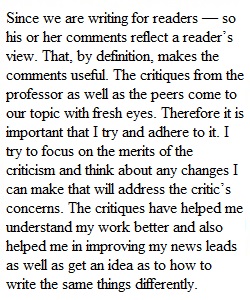


Q Midterm Course Reflection Let's face it: We want to be journalists (or at least learn journalism), in part, because we think we're pretty good writers. We're proud of the way we write. People have always told us we're good. Yet now we're submitting our best stuff to a professional to review and critique and grade and ... yikes! That stings! Oh, all that blood (read that "red ink") on my papers! And the worst part can be when I read something she's written on my paper and I could slap myself because I knew that was wrong! Oh, wait. I'm the evil person. But let me commiserate with you for a moment. Besides teaching journalism, I have worked my entire career as a journalist. And while it doesn't happen so frequently anymore (thank goodness, right?), I still occasionally get a story back from an editor who wants me to rewrite it, or at least revise it. And like you, I think, "It's perfect as it is! I worked for days on it. It doesn't need a single change! And perhaps more to the point: I don't want to work on that anymore! I thought I was finished! What does he know, anyway??" Also like you (am I right?), once I study what my editor wants me to change, I usually (reluctantly) have to concede he or she is right. Maybe I didn't quite adhere to that publication's style. Maybe I overlooked one of the points the editor told me she wanted me to cover. Maybe I was tired when I wrote it and executed some sentences poorly. Knowing I'm wrong doesn't make me feel any better. And believe me, the more experienced you get at this, the more of a pain in the @#%& it is to have an editor tell you to do it over. You see, your ego will only grow as you get better and more confident about your abilities. So while I'm truly, deeply sorry the feedback on your writing has hurt or frustrated or angered you--and I know that I have; I've been there--I also know that every time I recommend a change, you're one step closer to never making that mistake again. And the fewer mistakes you make, the less time you'll spend rewriting and revising--no matter the career in which you use these skills. The critical thinking and concise writing skills you're learning in this class are prized in all kinds of jobs. I also know that you wouldn't feel bad if you didn't have your ego invested in this work. So when you feel the sting, know it's because you're passionate about getting this right--and know I'm here to help you do it. Activity: How are you feeling now that you've had some critiques on your writing from me and from your classmates? Have you been able to see where there may be room for improvement? Do you have recommendations for how I or your peers could be better peer reviewers and editors? In response to this topic, please share your thoughts, and also respond to at least two of your classmates. Objective: To reflect assess the growth of your newswriting skills and identify where improvement is needed. Deadlines: Post your initial response by 11:59 p.m. ET Saturday. This will give you and your classmates time to offer each other support and advice for the second half of the class through the end of the academic week on Tuesday. (Response required.) - 30 -
View Related Questions